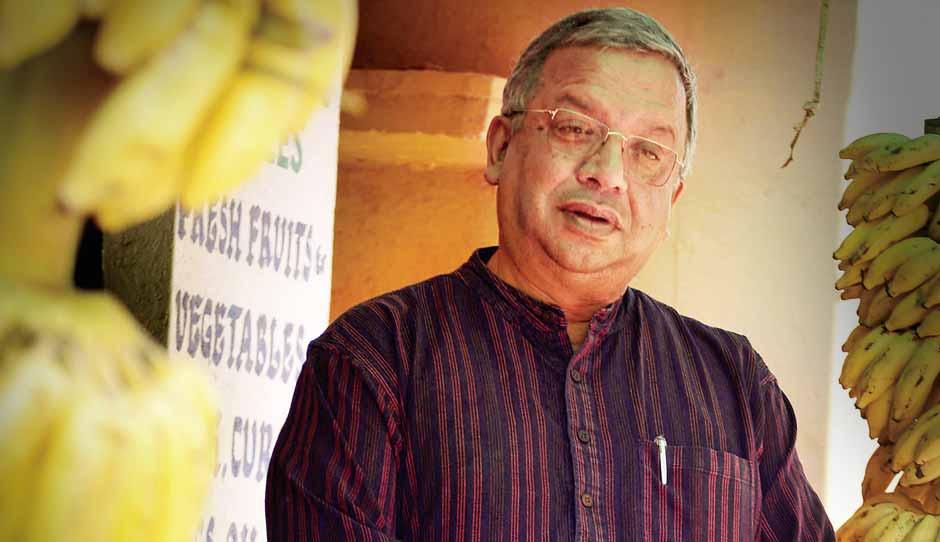How Samit Ghosh Built Ujjivan Financial Services
- BY Ira Swasti
 In Operations
In Operations 25441
25441 0
0

In the three decades he worked for CitiGroup and Bank Muscat, Samit Ghosh picked up every nuance of the banking business. That experience along with his family background (of being born in a middle-class family where he saw his parents’ fortune change with the 1985 revolution in the financial services industry) made Ghosh want to move to his next professional challenge, of making financial services available to the working poor by providing them loans. He founded Ujjivan Financial Services, a microfinance venture, in 2005, and in the past seven years, it has disbursed more than $580 million among a million customers. Interestingly, Ujjivan has also won the Great Place to Work award three times. Ghosh’s secrets to making that happen are simple— don’t work after office hours and ask employees to go home on time.
Over the years, we’ve realised that the best protection of our staff is only possible with the help of our customers.
I have three dogs, a German Shepherd, an Irish Setter and an adopted street dog that wake me up every morning around 6-6.30am. I can’t stay in bed after that because I have to let them out for a walk. After getting ready, I recharge for the day by lounging in the huge terrace area in my house in Whitefield, Bangalore that has a beautiful view of large green trees, for about half an hour to 45 minutes. This is the time I relax, have my breakfast and think about the day with owls and squirrels as my companions. My family is not an early riser like I am so I usually have my fixed breakfast of oat cereal with dry fruits and a glass of lemonade with honey in it, with my dogs who’re back home after their walk by then. I have three children but I get to spend maximum time with my eldest daughter. She works for our company’s foundation, Parinaam and we leave for office together around 8.15am. In the car, I try reading the newspaper if I’m not busy admiring the greenery outside. I reach office around 9am and the first thing I do is try to get my personal obligations such as paying bills out of the way before I get on with official work.
Once that is taken care of, I start my day by checking e-mails on my laptop. I get about 150-200 e-mails a day in my inbox, 30 per cent of which are usually junk. Earlier, I used to get mails on my phone too but then they started chasing me 24 hours of the day, seven days of the week and I decided to get rid of that. Now I prefer to check mails on my own time instead of having them chase me.
I usually keep my mornings open for one-on-one meetings with my staff, where they update me about the latest happenings in their branches or talk about various issues they’re facing in their regions. These are more like casual conversations or chats than meetings with my teams because I like to make sure that communication in the office is as open and healthy as possible. Having worked in a corporate environment for 30 years, I have been trying to do away with the backbiting and politics that comes with opaque communications systems in place.
I ensure that communication in the office is as open and healthy as possible.”- Samit Ghosh
Here, when a person does something well, we emphasise on sharing his or her secret of success with all the teams so that others can learn from it. There have been many incidents where our people have gone beyond their line of duty to help our customers. These stories are very inspirational for others in our teams. For instance, once our branch staff took complete care of a customer who was suffering from tuberculosis, admitted her children to an orphanage and even handled her last rites because her family couldn’t afford to. Another time, some thugs tried to snatch the cash bag that had all the cash collected from one of our operating areas. Our field agent was dragged for 15 metres and got hurt, but didn’t let go of the bag. Now, that’s incredible.
 Opening Up: Ghosh's favourite part of running Ujjivan is when he gets to visit and interact with his customers directly, to get feedback on the company's loan processing mechanisms.
Opening Up: Ghosh's favourite part of running Ujjivan is when he gets to visit and interact with his customers directly, to get feedback on the company's loan processing mechanisms. Sometimes, senior members in my team prod me not to share dangerous instances of attacks fearing that other staff members may get scared on hearing them. But I believe open and transparent communication in an organisation goes a long way in gaining the trust of employees. When we tell our employees about these attacks, especially in crime prone areas such as Western UP and Bihar, we talk to them about ways they can protect themselves and how we will help them. This helps assuage some of the sense of insecurity that could have crept in otherwise. Over the years, we’ve realised that the best protection of our staff is only possible with the help of our customers. Normally, the bad elements that attack the field staff are from the same locality. So we make sure we verbally emphasise that we are working for their good and our staff needs to be protected from any kind of attacks.
But, building trust around financial issues among the working poor living in urban or semi-urban slum areas takes time. What helps a lot in this case is constant communication and being open with them from the very beginning till the end. That way, they open up faster and relate to you better, too. So not just my field staff, but on my part as well, I ensure I visit each of the regions (north, south, east and west) where Ujjivan operates in, atleast once in three months. I wish I could do this more often but visiting each of the 299 branches across India is not possible.
Visiting customers, interacting with them and listening to their issues is the favourite part of my job. It also helps us to get direct feedback on our loan issuing procedure and our business in general. On my last field visit to Tamil Nadu, for instance, I asked customers what they believed was an acceptable waiting period for a loan to get sanctioned. They all said seven days. We communicated that to our staff, and worked to change our processes to make sure we had the ability to disburse loans in that seven-day time frame.
In fact, to infuse more enthusiasm into this initiative, we started a contest within our organisation to reduce the turnaround time where branches that managed to give out loans within seven days won cash prizes. This is not the first time we organised a competition among our employees to keep them motivated. Before this, we did an internal competition where employees were encouraged to get back old customers. In microfinance, like any other business, what happens is that some customers who had taken loans earlier drop out of the programme or sit idle, so the contest was to understand why they left, resolve their issues and get them back as new customers. Employees who got the maximum number of old customers won cash prizes worth thousands of rupees. A lot of time, in order to meet targets and deadlines at work, people tend to work on weekends and holidays.But I have always believed that if you work efficiently, you should be able to complete your work within office time and go back, except some peak periods at the end of the month when loan collections take place. So, we have a rule in the office where if someone wants to come and work on a weekend or on a holiday, he or she needs my special approval. That deters people from doing it.
We hire people based on referrals from our customers, and not just employees.
I used to think that the work of a field agent at Ujjivan is a difficult job in a difficult environment. But when the team from the Great Place to Work Institute came and did the survey of our employees’ engagement and motivation levels, they found that their biggest motivating factor was actually the work they do and the impact they can see on the lives of the working poor. Basic hygiene factors such as paying salaries on time, providing good increments on time and other HR management factors play a significant role, of course. But, it’s the above sentiment that differentiates this job from others.
Of course, bringing the right people in is the primary key to creating that culture. We have a unique hiring technique to ensure we only hire people who are comfortable working in tough environments such as urban slums. So, instead of just hiring people based on referrals from existing employees, we ask our customers to refer potential candidates to us. There are several cases where the mother in the family has taken a loan from us to run a small business, and her son works with us as a field agent, collecting those loans and educating others about our services and how to make use of it. Customers also have to go through a whole screening process before we do business with them. When we open a new branch in a locality, each branch manager or field representative go street by street wherever the poor are, and explain to them what we do, how they can avail our services, and how to form loan groups. When these potential applicants come to us, we ask them to form a group and come back and see us. Then they go through a training programme, basically an orientation into microfinance where they learn about the terms and conditions, what we offer and what kind of disciplines they need to follow to repay the loan in time. After this, they are taken through a test, and if they clear that, they are inducted into the programme. It’s sort of a literacy programme about microfinance where the loan takers know what they are getting into before they get into it.
Samit Ghosh talking about Ujjivan's focus on employee happiness and job satisfaction.
I am very strict about my work timings. Most days, I leave office by 5.30-6pm in the evening and so does most of the office. I’m very strict about the timings my staff keeps. If an employee is staying overtime, beyond say 7pm, a report arrives on my desk the next morning informing me about the same. I normally talk to the supervisors in that case to know the cause because working overtime is taken as a negative, not a positive. I admit there are some departments like finance where however much I try, people just want to come late and leave late because they prefer working in the evenings. I don’t have an issue with that but I don’t want to encourage it personally.
As I reach home, I relax, have tea and then hit the gym or go swimming on a good day, along with my daughter. My family and I are huge fans of the MasterChef, so after I come, we religiously watch that show together at night. When you run a business, it’s a 24/7 job, it’s always there in the back of your mind, so after some quality family time, I am back to checking my e-mails and then hit the bed by 11-11.30pm to be ready for the next day. Even on Sundays, after enjoying some cooking with my wife Elaine, in the evening, I list down all that needs to be accomplished at work the next week. It’s not difficult to be motivated when you work in a business like Ujjivan where you can see the direct impact of your work. It keeps you going.





























Add new comment